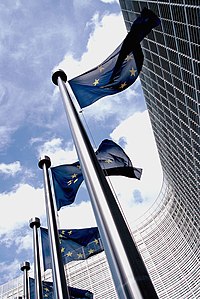
The European Union (EU) is a supranational political and economic union of 27 member states that are located primarily in Europe. The union has a total area of 4,233,255 km2 (1,634,469 sq mi) and an estimated total population of over 448 million. The EU has often been described as a sui generis political entity combining the characteristics of both a federation and a confederation.
Superpower describes a state or supranational union that holds a dominant position characterized by the ability to exert influence or project power on a global scale. This is done through the combined means of economic, military, technological, political, and cultural strength as well as diplomatic and soft power influence. Traditionally, superpowers are preeminent among the great powers. While a great power state is capable of exerting its influence globally, superpowers are states so influential that no significant action can be taken by the global community without first considering the positions of the superpowers on the issue.
In politics, soft power is the ability to co-opt rather than coerce. It involves shaping the preferences of others through appeal and attraction. Soft power is non-coercive, using culture, political values, and foreign policies to enact change. In 2012, Joseph Nye of Harvard University explained that with soft power, "the best propaganda is not propaganda", further explaining that during the Information Age, "credibility is the scarcest resource".
In international relations, power is defined in several different ways. Material definitions of state power emphasize economic and military power. Other definitions of power emphasize the ability to structure and constitute the nature of social relations between actors. Power is an attribute of particular actors in their interactions, as well as a social process that constitutes the social identities and capacities of actors.
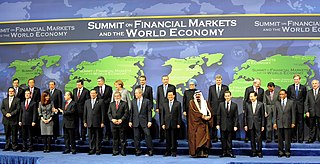
In international relations, a middle power is a sovereign state that is not a great power nor a superpower, but still has large or moderate influence and international recognition.

Jeremy Rifkin is an American economic and social theorist, writer, public speaker, political advisor, and activist. Rifkin is the author of 23 books about the influence of scientific and technological changes on the economy, the workforce, society, and the environment. His most recent books include The Age of Resilience (2022), The Green New Deal (2019), The Zero Marginal Cost Society (2014), The Third Industrial Revolution (2011), The Empathic Civilization (2010), and The European Dream (2004).

In international relations, regional power, since the late 20th century has been used for a sovereign state that exercises significant power within a given geographical region. States that wield unrivaled power and influence within a region of the world possess regional hegemony.
A superstate is defined as "a large and powerful state formed when several smaller countries unite", or "A large and powerful state formed from a federation or union of nations", or "a hybrid form of polity that combines features of ancient empires and modern states." This is distinct from the concept of superpower, although these are sometimes seen together.

In international relations, aid is – from the perspective of governments – a voluntary transfer of resources from one country to another.
Haiti—an island country 600 miles off the coast of the U.S. state of Florida—shares the Caribbean island of Hispaniola with the Dominican Republic. Haiti has received billions in foreign assistance, yet persists as one of the poorest countries and has the lowest human development index in the Americas. There have been more than 15 natural disasters since 2001 including tropical storms, flooding, earthquakes and hurricanes. The international donor community classifies Haiti as a fragile state. Haiti is also considered a post-conflict state—one emerging from a recent coup d'état and civil war.

European culture comprises a wide variety of national cultures, which influenced the creation of the various European nation-states. The process of European integration pursued by the European Union co-exists with national loyalties and national patriotism.
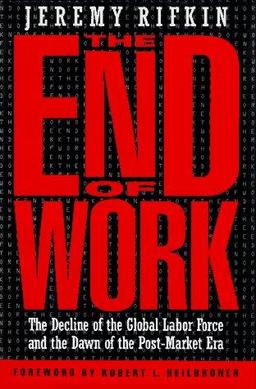
The End of Work: The Decline of the Global Labor Force and the Dawn of the Post-Market Era is a non-fiction book by American economist Jeremy Rifkin, published in 1995 by Putnam Publishing Group.

The European Federation, also referred to as the United States of Europe (USE), European State, or Federal Europe, is a hypothetical scenario of European integration leading to the formation of a sovereign superstate, organised as a federation of the member countries of the European Union (EU), as contemplated by political scientists, politicians, geographers, historians, futurologists and fiction writers. At present, while the EU is not a federation, various academic observers regard it as having some of the characteristics of a federal system.

A potential superpower is a state or other polity that is speculated to be or have the potential to become a superpower, a state or supranational union that holds a dominant position characterized by the ability to exert influence or project power on a global scale through economic, military, technological, political, and/or cultural means.
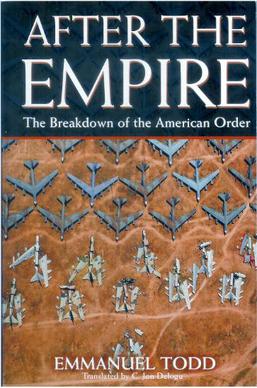
After the Empire: The Breakdown of the American Order is a 2001 book by French demographer and sociologist Emmanuel Todd. In it, Todd examines the fundamental weaknesses of the modern United States to conclude that, contrary to American conventional wisdom, America is fast losing its grip on the world stage in economic, military and ideological terms. Todd predicts the fall of the United States as the sole global superpower.

European Union–Pakistan relations are the international relations between the common foreign policy and trade relations of the European Union and the Islamic Republic of Pakistan.
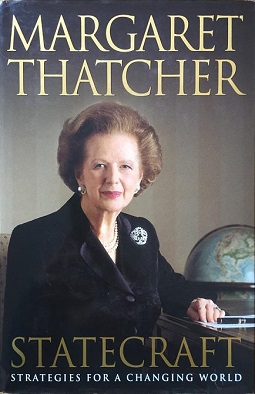
Statecraft: Strategies for a Changing World is a book on politics and international relations written by Margaret Thatcher in 2002 and was published by Harper Perennial.

The Empathic Civilization: The Race to Global Consciousness in a World in Crisis is a 2010 non-fiction book written by Jeremy Rifkin. It connects the evolution of communication and energy development in civilizations with psychological and economic development in humans. Rifkin considers the latest phase of communication and energy regimes—that of electronic telecommunications and fossil fuel extraction—as bringing people together on the nation-state level based on democratic capitalism, but at the same time creating global problems, like climate change, pandemics, and nuclear proliferation. Rifkin extrapolates the observed trend into the future, predicting that Internet and mobile technology along with small-scale renewable energy commercialization will create an era of distributed capitalism necessary to manage the new energy regime and a heightened global empathy that can help solve global problems.
The balance of threat theory was proposed by Stephen M. Walt in his article Alliance Formation and the Balance of World Power, published in the journal International Security in 1985. It was later further elaborated in his book The Origins of Alliances (1987). The theory modified the popular balance of power theory in the neorealist school of international relations.

The Third Industrial Revolution; How Lateral Power is Transforming Energy, the Economy, and the World is a book by Jeremy Rifkin published in 2011. The premise of the book is that fundamental economic change occurs when new communication technologies converge with new energy regimes, mainly, renewable electricity.

